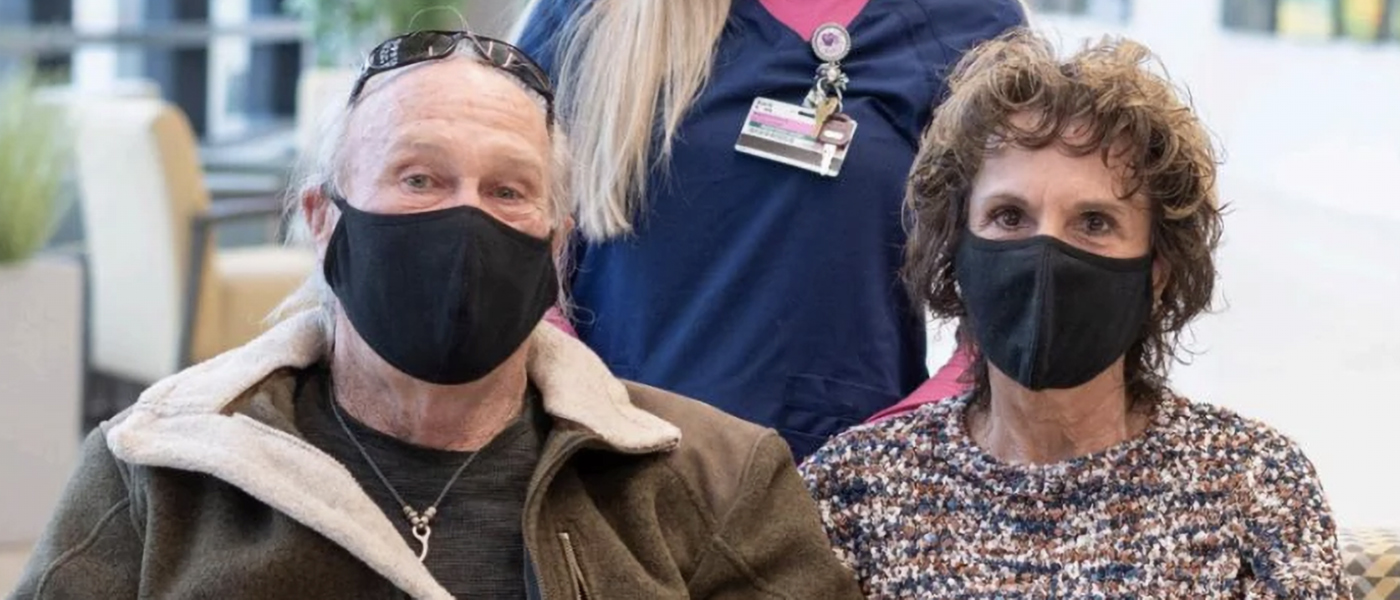Don Gray was hospitalized for 51 days, but he was victorious over COVID-19.
It was the Friday after Memorial Day when Lana Gray returned from work to find her husband, Don, sitting with his head on the kitchen table at their Hot Springs home. Normally, her husband of 40 years is energetic, the kind of man who can’t sit still. On this day he was exhausted; he just wanted to sleep.
“I thought, that’s not him,” Lana recalled.
What they didn’t know at the time was that Don, now 63, was about to begin the fight of his life. He would spend 51 days in the Monument Health Rapid City Hospital COVID-19 Unit.
The Hardest Thing
That weekend, Don’s condition worsened. By Sunday he was throwing up, and on Monday he went to Fall River Health Services for a COVID-19 test; it was positive. Back at home, Don’s condition deteriorated quickly. He fell several times, but still thought he could stay home.
“He’s so stubborn,” Lana said.
Don shrugged, smiled and said, “I used to rodeo when I was younger. Hitting the ground was no big deal.”
On Tuesday morning, Lana drove him to Rapid City Hospital. Due to visitor restrictions at the time, Lana wasn’t able to go inside. She didn’t know if she would ever see him again.
“It was the hardest thing I’ve ever done,” she said, tears welling up in her eyes. “I just dropped him off and left.”
COVID-19 is caused by a coronavirus called SARSCoV- 2
It can have a range of symptoms, from coughing and trouble breathing to loss of taste or smell. The virus can lead to more serious conditions like respiratory failure, heart problems or death. Luckily, most patients recover from COVID-19 with few lingering side effects.
Show More 
Staying in Touch
“It seems like the COVID-19 virus either treats you nice, or it tries to kill you,” Don said. Less than 48 hours after testing positive, he was put on a ventilator. He had total respiratory and kidney failure, and blood in his stomach and intestines. At times he was so disoriented he had to be physically restrained. Physicians put him in a medically induced coma for 45 days to allow his body to heal.
Don doesn’t remember much about his time in the hospital. “I had some wonderful dreams. They put ‘The Matrix’ to shame,” he said.
Throughout his stay, the hospital staff communicated with Lana by telephone. Karli Shama, RN, kept in regular touch, growing close to the entire Gray family in the process. “She made an impression on all of us,” Lana said. “Anytime we got to talk to Karli, it was a good day. We had a very special relationship.”
“It was the hardest thing I’ve ever done,” she said. tears welling up in her eyes. “I just dropped him off and left.” – Lana, Don Gray’s wife
In addition to Karli, Lana also thanked the rest of the hospital staff. Nurses Jessica Ramse and Brock Sanderson, and Nurse Supervisor Amanda Dosch were among the caregivers that made an impression on Lana. “And I’m so lucky that I had the support of my sons,” she added.
Karli recalled that her biggest challenge in their conversations was to strike a balance between optimism and realistic expectations of his condition. “I didn’t want to give them false hope,” she said.
Karli still remembers how excited she was when she could tell the family that Don had become less disoriented and was responding to commands. It was six weeks before Lana could see her husband in person. The first time was scary, she recalled. “I had to be strong for him. I didn’t want to cry,” she said, as fresh tears welled up in her eyes.
His condition started improving, and by July 23 he was in a wheelchair headed for the exit doors of Rapid City Hospital. His path was lined with applauding Monument Health caregivers who had gathered to give him a hero’s sendoff.
Don’s Most Lasting Effect
Months after he left the hospital, Don still has reduced senses of taste and smell. He also has numbness in his right leg and left foot. “My eyesight took a hit,” he added. However, he didn’t end up with chronic breathing difficulty or other health problems experienced by some of the so-called COVID-19 long-haulers.
Maybe COVID-19’s most lasting effect was on his personal outlook. He still gets choked up thinking about the future he almost didn’t have.
“Every day, I get to see what I would have missed,” he said.

